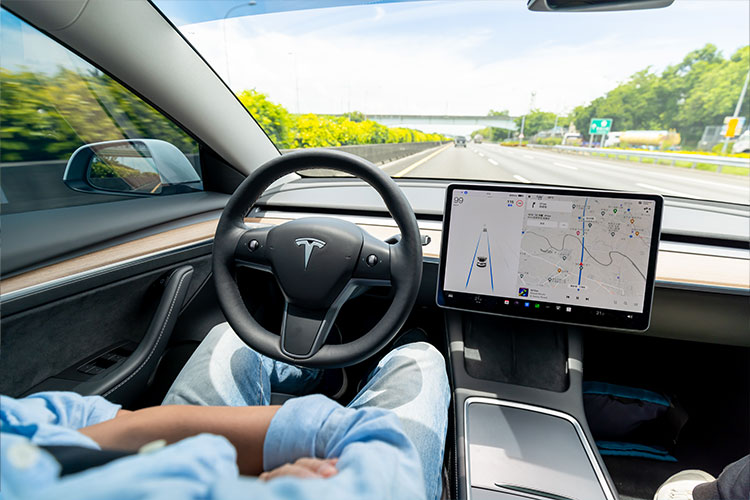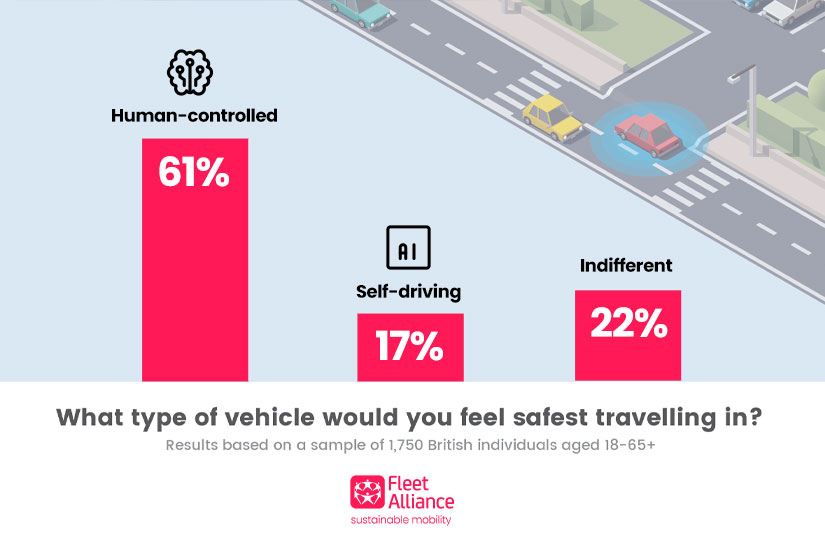S h a r e
New Study Reveals Public’s Lack of Trust in Driverless Vehicles

Posted by
Charlie Strand
February 2025
A new study by Fleet Alliance has identified that the UK public does not yet have full confidence in autonomous (self-driving) vehicles.
1,750 British individuals aged 18-65+ were surveyed, resulting in an astounding majority of all respondents revealing that they would not feel safer in a self-driving vehicle when compared to a human driver-controlled one.
The exact question which was put to respondents was: What Type of Vehicle Would You Feel Safest Travelling In?
A large majority (just under two-thirds) indicated that they would feel safest in a human-driven vehicle. Whereas, only 1 in 6 stated that they would feel safest in a self-driving vehicle. The public answered as follows (Please contact us for a full copy of all the results):

Difference Between Ages and Genders
When analysing the answers between respondents there are some clear trends worthy of note.
Female Drivers
Female respondents had noticeably higher confidence in human-driven vehicles than men.
* Females trust human-driven vehicles 10% more than their tech-trusting male counterparts.
Over 65s
Respondents over 65 year olds had by far the highest confidence in human-driven vehicles.
* Individuals over 65 are 17% more likely than 18-24 year olds to trust a human driver the most.
Reasons For Responses
When looking into the reasons why people might not want to be transported in a driverless vehicle, a recent study of 2,134 individuals by Aviva provides some insights:
- Would rather be in control: 42%
- Wouldn’t trust the tech: 41%
- Don’t understand enough about them: 9%
- Concerned about being on the roads with non-driverless cars: 7%
The reasons given above indicate that car manufacturers have huge barriers to overcome before launching self-driving vehicles successfully. If the public’s lack of confidence and concerns aren’t addressed it seems likely that autonomous vehicles will be a commercial flop.
The marginally highest individual reason of ‘I would rather be in control’ is a personal preference. This is something which is very hard to overcome or change with simple marketing and PR. So immediately a large proportion of the market is isolated from the product.
However, not trusting the technology and not knowing enough about autonomous vehicles can be changed with consumer education. The individuals who responded with answers (2) and (3) above are the target market for car manufacturers to win over. These two respondent groups make up 50% of the market who currently don’t want to use a driverless vehicle. Therefore there’s a big pool of potential buyers waiting to be won over.
The Facts on Self-Driving Vehicles
We discussed where driverless technology is heading with Alain Dunoyer PHD from SBD Automotive, a leading research body on automotive technology.
Cars will gradually become more autonomous over the next 20 years. Today, the focus on autonomous features is to help prevent accidents. Longer-term, the focus is on eliminating the need to drive altogether, giving people back the time they usually spent driving to work. If we look at current levels of automation, the systems are built to help, not replace the driver. The obvious exception to this being the technology currently deployed in modern Tesla’s, which features fairly robust and well-tested ‘Autopilot and Full Self-Driving Capabilities’. However, even Tesla state that the technology at the point of writing ‘reduces your overall workload as a driver’, it is not a tool to replace the driver.
It is therefore important to remember that today’s cars are not fully autonomous. A car is an incredibly useful tool, but we’re careful to make sure that the people who drive them are trained, tested and licensed to use them. In the same way, drivers must know the capabilities and the limitations of the systems they are using. These systems need to work with drivers, so while there are situations where the average driver is safer, and there are situations where the autonomous systems are safer, both are safest when working together, with an informed driver who knows, at any given point, what their autonomous car is capable of.
You also might like…
If you liked this article then check out our posts about similar topics
First Drive: Why Audi’s Q4 e-Tron matters
The Company Car Sweet Spot for future-proofing your Fleet An Audi badge says professional without drifting into show-of...
First Drive: Jaecoo 7 – Range-Rover Looks on a £30k Budget
Why this newcomer matters China’s Chery Group is taking the UK by storm with a two-brand strategy: Omoda targets mains...
Good-enough lease rates aren’t good enough anymore: Introducing Multi-Bid Tendering
In a climate of persistent inflation, unpredictable tariffs and relentless cost pressure, “we’ve always done it this...
Become a Fleet Alliance business partner
I am writing to you about the opportunity to become a business partner of Fleet Alliance The commercial arrangement a...
Charting a Greener Course: Chris Rowthorn signs the Business Wales Green Growth Pledge
When seasoned automotive finance professional Chris Rowthorn left MotoNovo after more than two decades to become a Flee...
Outsourcing Your Fleet: 10 Reasons Fleet Alliance Makes Perfect Sense for Busy Fleet Managers
Running a large corporate fleet means you’re under constant pressure to hit cost, compliance, and sustainability targe...
What makes Fleet Alliance a winner in the SME fleet sector?
We all like an award, an additional trophy for the cabinet - the recognition is important and it’s always good to rece...
10 great cars to have on salary sacrifice 2025
Employers and employees are really catching on to salary sacrifice because you can drive a brand new electric car (EV) a...
Ready to make the management of your fleet more efficient?
Request a call back
